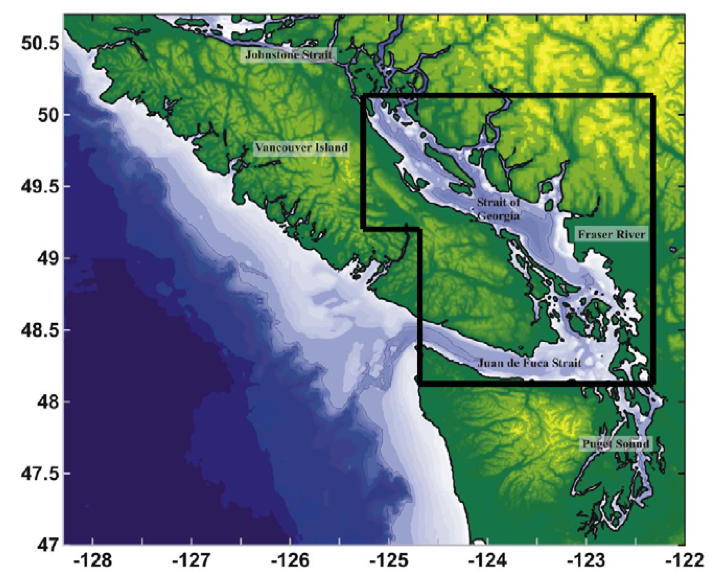
News/Reports
DFO Ecosystem Approach to Management of Marine Reserves 2012
Science Advisory Report 2012/072
A synthesis of the outcomes from the Strait of Georgia Ecosystem Research Initiative, and development of an ecosystem approach to management
Accessed Feb2014 from: http://www.dfo-mpo.gc.ca/csas-sccs/Publications/SAR-AS/2012/2012_072-eng.html
Summary
- Selected results are synthesized from the Strait of Georgia Ecosystem Research Initiative (ERI), as a contribution to developing an ecosystem approach to the management of this marine system;
- The synthesis provides an overview of some of the key findings regarding the current understanding of how the Strait of Georgia marine ecosystem ‘works’, the drivers of change acting on the Strait and how some of these may influence the Strait in the mid-future;
- Several ecosystem-related science-based tools (assessments and models) were developed to describe ecosystem processes. These also identified some specific considerations for management and can provide information to assist with management decisions. Some tools can readily be applied to all B.C. marine areas, whereas others are complex with extensive data needs;
- For the Strait of Georgia and other areas, potential indicators need to be identified and prioritized, including their data requirements, to meet objectives relating to an ecosystem approach to management. A comprehensive review and evaluation of all potential ecosystem indicators was not conducted. However, several studies did identify potential ecosystem-level indicators for specific management objectives;
- To implement an ecosystem approach to management (EAM), a process for the collaboration and coordination among Sectors is necessary. A cross-sector working group is recommended. This working group could also serve to interact with other Regions and other external initiatives;
- Consideration of productivity regimes and food web dynamics (predation and prey requirements) should be integrated into stock assessments, and used to inform other Departmental planning processes;
- The near-shore zone in the Strait of Georgia, and elsewhere in the Pacific Region, is poorly described and its role in ecosystem processes is not well understood. To provide science advice with respect to the value of this zone to ecosystem dynamics, including fish productivity, further study is necessary;
- Ecosystem data are dispersed and in a variety of formats, making their collection and synthesis difficult; common platforms and formats for storage and access of these data are needed;
- Tools developed through this process have broader applicability than just the Strait of Georgia and should be considered for other areas of the Pacific coast.
 This Science Advisory Report is from the September 11-13, 2012 meeting on a synthesis of the outcomes from the Strait of Georgia Ecosystem Research Initative, and their ecosystem-based management and policy implications. Additional publications from this process will be posted as they become available on the Fisheries and Oceans Canada Science Advisory Schedule at www.dfo-mpo.gc.ca/csas-sccs/index-eng.htm.
This Science Advisory Report is from the September 11-13, 2012 meeting on a synthesis of the outcomes from the Strait of Georgia Ecosystem Research Initative, and their ecosystem-based management and policy implications. Additional publications from this process will be posted as they become available on the Fisheries and Oceans Canada Science Advisory Schedule at www.dfo-mpo.gc.ca/csas-sccs/index-eng.htm.
View the full PDF : DFOecosapproach2012
Research Initiative began in January 2008, and concluded its directly-funded phase on 31 March 2012. The synthesis described in this report, arising largely from projects funded by this initiative, provides a conceptual understanding of how the Strait of Georgia marine ecosystem works, some aspects of itsrelationships with the human social system of this region, and some important considerations for its management using an ecosystem approach. In addition, it provides guidance as to tools useful for providing science advice in an ecosystem context. Recommendations for a process to deliver Science advice for an ecosystem approach to management in Pacific Region are also provided. This Science Advisory Report is from the 11- 13 September 2012 Regional Peer Review meeting reviewing: “A synthesis of the out comes from the Strait of Georgia Ecosystem Research Initiative, and their ecosystem approaches to management and policy implications”. Additional publications from this process will be posted as they become available on the Fisheries and Oceans Canadian Science Advisory Secretariat website at www.dfo-mpo.gc.ca/csas-sccs/index-eng.htm.
See the full PDF here:
